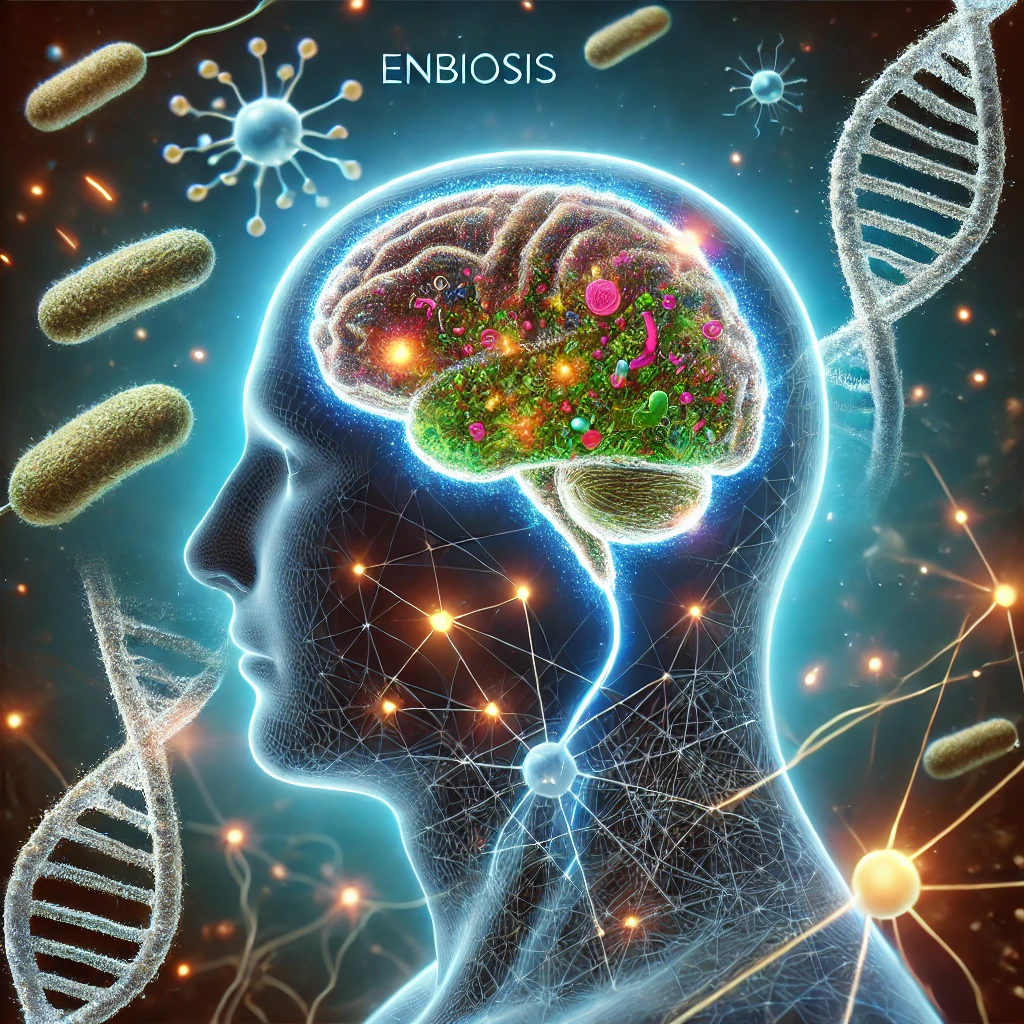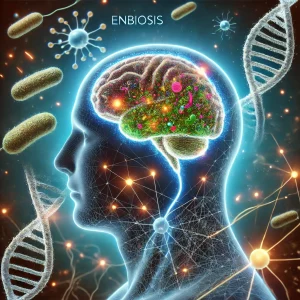Table of Contents
How Does the Gut Microbiome Influence Alzheimer’s Disease?
Alzheimer’s disease is a form of dementia, a condition that affects more than 55 million individuals worldwide, with cases expected to rise to 139 million by 2050 (1) As the leading cause of dementia, Alzheimer’s disease accounts for between 60 and 70% of these cases (2) Like other types of dementia, this devastating neurodegenerative disorder is characterized by memory loss, cognitive decline, language problems and behavioral changes.
Despite decades of research into Alzheimer’s and dementia, there is currently no cure, and medical treatments can only offer limited relief. But what if the key to slowing, or even preventing Alzheimer’s isn’t just in the brain, but in the gut? Traditionally, research has focused on the effects of genetic factors on our brain pathology, but researchers are now shifting their attention elsewhere—to the microbes living within our digestive system.
How Does the Gut Microbiome Affect Cognitive Health?
Our gut microbiome has a profound effect on many aspects of our health, including our brain function. The microbes in our gut communicate with our brain via a complex system known as the gut-brain axis. This means that changes in the composition of our gut microbiome can influence our mood, behavior, and cognitive functions. One of the key ways the gut microbiome influences our cognitive health is by modulating our immune system. The gut is home to between 70 and 80% of our body’s immune cells (3), and imbalances in our gut bacteria can lead to chronic inflammation. This inflammation can trigger neuroinflammation in the brain, a factor believed to contribute to cognitive decline associated with neurodegenerative diseases such as Alzheimer’s. (4)
The gut microbiome also regulates the production, movement and function of key neurotransmitters within our brain, including serotonin, dopamine and gamma-aminobutyric acid (GABA) (5) Gut dysbiosis, or an imbalance of gut bacteria, can disrupt the production of these important neurotransmitters.
Additionally, the gut microbiome and its metabolites have an impact on the integrity of the blood-brain barrier (BBB), which serves as a selective shield, protecting the brain from harmful substances. When the microbiome is out of balance, it can increase the permeability of the BBB, allowing harmful compounds to enter the brain (6) These compounds can promote inflammation and damage to the brain tissue. Recent evidence also suggests that our gut microbes could be involved in the production and regulation of amyloid-beta (Aβ), a key protein linked to Alzheimer’s disease (7). The accumulation of Aβ proteins in the brain forms amyloid plaques, which are one of the hallmark features of Alzheimer’s.
Lastly, the gut microbiome produces short-chain fatty acids (SCFAs) such as acetic acid, propionic acid, and butyric acid, during the fermentation of dietary fiber. SCFAs have anti-inflammatory properties and help to protect the brain from neurodegenerative diseases by regulating inflammatory pathways, as well as the formation of amyloid plaques and tau protein hyperphosphorylation. (8)
 Alzheimer’s and Gut Dysbiosis: What Does the Science Say?
Alzheimer’s and Gut Dysbiosis: What Does the Science Say?
Multiple studies have demonstrated distinct differences in the gut microbiomes of Alzheimer’s patients compared to those of healthy controls. These differences often involve a reduction in gut microbial diversity, as well as significant alterations in the relative abundance of specific bacterial species.
For instance, one study demonstrated that Alzheimer’s disease (AD) patients have a gut microbiome population that is distinct from that of sex- and age-matched controls. A marked reduction in overall microbiome diversity was observed, with decreased levels of Firmicutes and Bifidobacterium and a corresponding increase in Bacteroidetes (9). Another study similarly found lower Firmicutes levels and increased Proteobacteria in AD patients (10)
More specifically, one study identified a significant decrease in butyrate-producing bacteria, such as Faecalibacterium in AD patients, alongside a marked increase in lactate-producing bacteria, including Bifidobacterium (11) Since butyrate plays a key role in reducing inflammation and maintaining gut barrier integrity, its depletion may contribute to the systemic inflammation seen in Alzheimer’s disease.
Further evidence of this inflammatory link comes from research showing a significant increase in pro-inflammatory bacteria, including Escherichia and Shigella and a reduction in the anti-inflammatory species Eubacterium rectale in individuals with cognitive impairment and brain amyloidosis (12) This suggests that gut dysbiosis may trigger a chronic inflammatory state that exacerbates neurodegeneration.
Importantly, gut dysbiosis does not only emerge in late-stage Alzheimer’s—it actually appears early in the disease process and worsens over time. Studies indicate that patients newly diagnosed with AD already exhibit gut microbiome imbalances, including a decrease in potentially protective bacteria such as Bacteroides and an increase in pro-inflammatory species such as Prevotella (13)
Notably, another study demonstrated that the gut microbiome composition changes progressively with increasing severity of Alzheimer’s disease. As cognitive impairment worsened, the abundance of Firmicutes and Bacteroides within the gut gradually decreased, while Proteobacteria, Verrucomicrobia, and Actinobacteria levels increased (14) These shifts highlight a clear microbial signature associated with disease progression, reinforcing the potential role of gut dysbiosis in driving neurodegeneration.
Collectively, these findings indicate that gut microbiome imbalances are not just present in Alzheimer’s disease—they emerge early and evolve as the disease worsens. This raises an important question: could modifying the gut microbiome help to slow or even prevent cognitive decline?
 Can Restoring the Gut Microbiome Help to Protect the Brain?
Can Restoring the Gut Microbiome Help to Protect the Brain?
Dietary modifications can significantly influence our gut microbiome and, by extension, our brain health. In recent years, a growing body of research has supported the idea that modulating our gut microbiome through informed dietary and lifestyle changes offers promising potential for protecting our brain from neurodegenerative diseases such as Alzheimer’s and dementia.
In support of this, a 2023 review article highlights the promising potential of gut microbiome-targeted therapies in improving outcomes for Alzheimer’s patients. The reviewed findings indicate a significant relationship between gut health and the progression of AD, suggesting that restoring a healthy gut microbiota may alleviate symptoms and slow disease development. Various interventions, including probiotics, prebiotics and synbiotics are explored as potential therapeutic strategies, with encouraging data from early preclinical and some clinical studies. (15)
However, to maximize the efficiency of microbiome-targeting therapies, a personalized approach is crucial. Each individual’s microbiome is unique, and this means that tailoring interventions to a person’s specific gut profile will yield the best results. For instance, different probiotic strains may have varying effects on cognitive function. This was shown in a 2022 study where 90 patients with mild to moderate AD were given either Lactobacillus rhamnosus or Bifidobacterium longum supplements, or a placebo, twice daily for 12 weeks (16) Participants taking the B. longum probiotic supplement experienced a greater improvement in cognition compared to both the placebo and L. rhamnosus groups. This highlights the importance of testing your microbiome, as it can reveal bacteria that are either lacking or in excess, allowing for targeted interventions that are more likely to be effective.
 Enbiosis’ Science-Backed Approach to Brain Health
Enbiosis’ Science-Backed Approach to Brain Health
At Enbiosis, we offer a cutting-edge, AI-powered gut microbiome testing service that helps uncover any imbalances that could be affecting your brain health. We provide insights into your gut health, as well as personalized food recommendations, and suggestions for prebiotics and probiotics, all backed by the latest scientific research. Contact us today to discover more about our approach and find out how we can support you with our evidence-based solutions.
Learn MoreReferences
1 World Health Organization. (2021). Global status report on the public health response to dementia. World Health Organization. https://digitalcommons.fiu.edu/srhreports/health/health/65/
2 World Health Organization. (2023). Dementia. https://www.who.int/news-room/fact-sheets/detail/dementia
3 Wiertsema, S. P., Garssen, J., & J Knippels, L. M. (2021). The Interplay between the Gut Microbiome and the Immune System in the Context of Infectious Diseases throughout Life and the Role of Nutrition in Optimizing Treatment Strategies. Nutrients, 13(3), 886.
4 Heneka, M. T., M., W., Jessen, F., Hoozemanns, J., Thal, D. R., Boche, D., Brosseron, F., Teunissen, C., Zetterberg, H., Jacobs, A. H., Edison, P., Ramirez, A., Cruchaga, C., Lambert, J., Laza, A. R., Vicente, J., Fischer, A., Stein, T. D., Kleineidam, L., Riechers, S et al. (2024). Neuroinflammation in Alzheimer disease. Nature Reviews Immunology, 1-32.
5 Chen, Y., Xu, J., & Chen, Y. (2021). Regulation of Neurotransmitters by the Gut Microbiota and Effects on Cognition in Neurological Disorders. Nutrients, 13.
6 Xie, J., Bruggeman, A., De Nolf, C., Vandendriessche, C., Van Imschoot, G., Van Wonterghem, E., Vereecke, L., & Vandenbroucke, R. E. (2023). Gut microbiota regulates blood‐cerebrospinal fluid barrier function and Aβ pathology. EMBO Journal, 42(17), e111515.
6 Jin, J., Xu, Z., Zhang, L., Zhang, C., Zhao, X., Mao, Y., Zhang, H., Liang, X., Wu, J., Yang, Y., & Zhang, J. (2023). Gut-derived β-amyloid: Likely a centerpiece of the gut–brain axis contributing to Alzheimer’s pathogenesis. Gut Microbes, 15(1), 2167172
7 Qian, X. H., Xie, R. Y., Liu, X. L., Chen, S. D., & Tang, H. D. (2022). Mechanisms of Short-Chain Fatty Acids Derived from Gut Microbiota in Alzheimer’s Disease. Aging and Disease, 13(4), 1252–1266.
8 Vogt, N. M., Kerby, R. L., Dill-McFarland, K. A., Harding, S. J., Merluzzi, A. P., Johnson, S. C., Carlsson, C. M., Asthana, S., Zetterberg, H., Blennow, K., Bendlin, B. B., & Rey, F. E. (2017). Gut microbiome alterations in Alzheimer’s disease. Scientific Reports, 7, 13537.
9 Liu, P., Wu, L., Peng, G., Han, Y., Tang, R., Ge, J., Zhang, L., Jia, L., Yue, S., Zhou, K., Li, L., Luo, B., & Wang, B. (2019). Altered microbiomes distinguish Alzheimer’s disease from amnestic mild cognitive impairment and health in a Chinese cohort. Brain, Behavior, and Immunity, 80, 633-643.
10 Ling, Z., Zhu, M., Yan, X., Cheng, Y., Shao, L., Liu, X., Jiang, R., & Wu, S. (2021). Structural and Functional Dysbiosis of Fecal Microbiota in Chinese Patients With Alzheimer’s Disease. Frontiers in Cell and Developmental Biology, 8, 634069.
11 Cattaneo, A., Cattane, N., Galluzzi, S., Provasi, S., Lopizzo, N., Festari, C., Ferrari, C., Guerra, U. P., Paghera, B., Muscio, C., Bianchetti, A., Volta, G. D., Turla, M., Cotelli, M. S., Gennuso, M., Prelle, A., Zanetti, O., Lussignoli, G., Mirabile, D., Bellandi, D., et al. (2017). Association of brain amyloidosis with pro-inflammatory gut bacterial taxa and peripheral inflammation markers in cognitively impaired elderly. Neurobiology of Aging, 49, 60–68.
12 Guo, M., Peng, J., Huang, X., Xiao, L., Huang, F., & Zuo, Z. (2021). Gut Microbiome Features of Chinese Patients Newly Diagnosed with Alzheimer’s Disease or Mild Cognitive Impairment. Journal of Alzheimer’s disease : JAD, 80(1), 299–310.
13 Chen, L., Xu, X., Wu, X., Cao, H., Li, X., Hou, Z., Wang, B., Liu, J., Ji, X., Zhang, P., & Li, H. (2022). A comparison of the composition and functions of the oral and gut microbiotas in Alzheimer’s patients. Frontiers in Cellular and Infection Microbiology, 12, 942460.
14 Zhang, T., Gao, G., Kwok, L. Y., & Sun, Z. (2023). Gut microbiome-targeted therapies for Alzheimer’s disease. Gut microbes, 15(2), 2271613.
15 Akhgarjand, C., Vahabi, Z., Etesam, F., & Djafarian, K. (2022). Effects of probiotic supplements on cognition, anxiety, and physical activity in subjects with mild and moderate Alzheimer’s disease: A randomized, double-blind, and placebo-controlled study. Frontiers in Aging Neuroscience, 14, 1032494.


 Alzheimer’s and Gut Dysbiosis: What Does the Science Say?
Alzheimer’s and Gut Dysbiosis: What Does the Science Say? Can Restoring the Gut Microbiome Help to Protect the Brain?
Can Restoring the Gut Microbiome Help to Protect the Brain? Enbiosis’ Science-Backed Approach to Brain Health
Enbiosis’ Science-Backed Approach to Brain Health